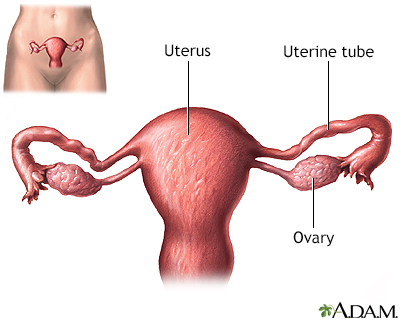Sterilization surgery - making a decision
Deciding to have sterilization surgery
A sterilization surgery is a procedure done to permanently prevent future pregnancies.
The following information is about deciding to have a sterilization surgery.

Hysterectomy is surgical removal of the uterus, resulting in inability to become pregnant. This surgery may be done for a variety of reasons including, but not restricted to, chronic pelvic inflammatory disease, uterine fibroids and cancer. A hysterectomy may be done through an abdominal or a vaginal incision.

Surgical sterilization which permanently prevents the transport of the egg to the uterus by means of sealing the fallopian tubes is called tubal ligation, commonly called having one's tubes tied. This operation can be performed laparoscopically or in conjunction with a Cesarean section, after the baby is delivered. Tubal ligation is considered permanent but reversals can be done in many cases.

The ovaries are connected to the uterus by the uterine tubes (fallopian tubes). The egg travels through the tube to the uterus.
Information
Sterilization surgery is a procedure to permanently prevent reproduction.
- Surgery in women is called tubal ligation.
- Surgery in men is called a vasectomy.
People who do not want to have any more children may choose to have sterilization surgery. However, some may regret the decision later. Men or women who are younger at the time they have surgery are more likely to change their minds and want children in the future. Even though either procedure can sometimes be reversed, both must be considered permanent forms of birth control.
When deciding if you want to have a sterilization procedure, it is important to consider:
- Whether or not you want any more children in the future
- What you might want to do if something were to happen to your spouse or any of your children
If you answered that you might want to have another child, then sterilization is not the best option for you.
There are other options for preventing pregnancy that are not permanent. Talk to your health care provider about all the options available to you before making the decision to have a sterilization procedure.
References
Isley MM. Postpartum care and long-term health considerations. In: Landon MB, Galan HL, Jauniaux ERM, et al, eds. Gabbe's Obstetrics: Normal and Problem Pregnancies. 8th ed. Philadelphia, PA: Elsevier; 2021:chap 24.
Rivlin K, Davis AR. Contraception and abortion. In: Gershenson DM, Lentz GM, Valea FA, Lobo RA, eds. Comprehensive Gynecology. 8th ed. Philadelphia, PA: Elsevier; 2022:chap 13.
Version Info
Last reviewed on: 3/31/2024
Reviewed by: LaQuita Martinez, MD, Department of Obstetrics and Gynecology, Emory Johns Creek Hospital, Alpharetta, GA. Also reviewed by David C. Dugdale, MD, Medical Director, Brenda Conaway, Editorial Director, and the A.D.A.M. Editorial team.
